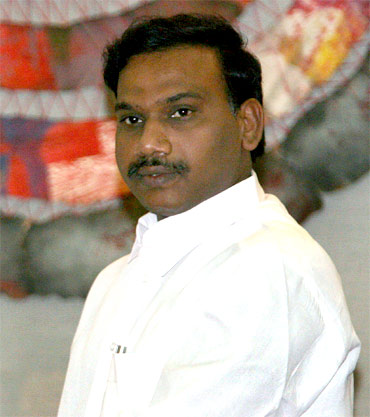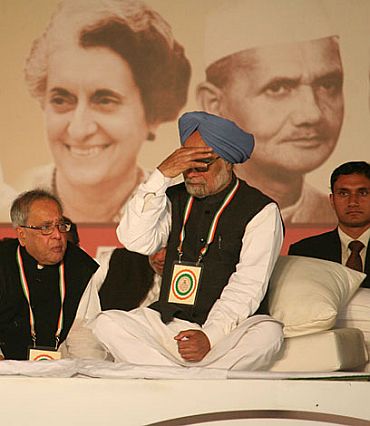 | « Back to article | Print this article |
2G scam: Sonia, Dr Singh using diversionary tactics
Sonia Gandhi and the prime minister seem to be calculating that if they continue to stonewall the demand for a JPC and avoid a comprehensive inquiry, there could be a backlash against the opposition and public memory will start forgetting the scams. This should not be allowed to happen, says B Raman
Congress President Sonia Gandhi and Prime Minister Dr Manmohan Singh have been living in a make-believe world of their own, totally cut off from reality. This became apparent from their speeches at the just concluded 83rd plenary session of the Congress on the outskirts of New Delhi.
The reality is the plethora of serious corruption cases that have come to the fore one after the other for more than a year now -- in the government of India as well as in the state of Maharashtra. These cases demanded prompt action for their investigation and prosecution of those involved in the cases -- either at the political level or at the level of bureaucrats or both.
Instead of initiating prompt action in a manner that would satisfy the public, attempts have been made to drag their feet in order to avoid having to take action while pretending to act. Instead of acting against the wrong-doers through the investigative agencies such as the Central Bureau of Investigation, these agencies were kept away from the wrong-doers in a blatant manner in an attempt to protect them from the legal consequences of their wrong-doing.
Click on NEXT to read further...
Serious dereliction of duty
Whenever the CBI takes up a case of suspected corruption for preliminary inquiry or investigation, it is expected to initiate three steps immediately after taking cognizance of the complaint -- firstly, seize documents that could have a bearing on the inquiry or investigation to prevent their being tampered with or destroyed; secondly, identify and freeze bank accounts that could be connected with the wrong-doing in order to prevent the money-trail from being destroyed; and thirdly, seize the passports and other travel documents of the suspects under inquiry or investigation in order to prevent them from fleeing the country.
Arrests follow later for custodial interrogation before prosecution. None of these steps was taken -- particularly in the case relating to the so-called 2G spectrum scam in the ministry of telecommunications in which the principal suspect is A Raja, who had to resign as minister following the submission of a report by the Comptroller and Auditor-General of India drawing attention to the massive irregularities allegedly committed by him during his tenure as the minister. He allegedly committed these irregularities not clandestinely, but blatantly in a manner that was widely known in the ministry.
No attempt seems to have been made for months by senior officials of the Prime Minister's Office and the Cabinet Secretariat to prevent Raja from misusing his office and, if they did not succeed in doing so, to draw the attention of the prime minister to his misdeeds and seek his intervention. If they had not done so, it was dereliction of duty of a serious nature on their part.
Is Dr Singh effective?
On the contrary, if they had done so, but if the prime minister had not acted on their caution, it was dereliction of duty by the prime minister for which he cannot escape responsibility.
There have been derelictions of duty at various levels -- political and bureaucratic -- probably going up to the prime minister. The question is not just whether Dr Manmohan Singh is an honest man of tremendous integrity. The question is whether Is the head of the Cabinet and the government in rooting out such instances of corruption. There was a colossal failure of leadership by the prime minister who showed poor reflexes in dealing with the allegations and in failing to act against Raja and others involved.
A CBI inquiry -- even if it be under the supervision of the Supreme Court -- can only go into the criminal ramifications of the case. It cannot go into the administrative and policy ramifications. Nor can it identify leadership deficiencies at various levels, which made this scam possible.
Only a comprehensive inquiry by a Joint Parliamentary Committee into the various aspects of the scam -- political, administrative and criminal -- can throw light on what happened, how it happened, who were the dramatis personae and how it remained undetected. Only a JPC can identify and zero in on lapses at the Cabinet level.
Why is the PM opposing a JPC probe?
By opposing such a comprehensive enquiry by a JPC, the prime minister and Sonia Gandhi are apparently trying to keep the inquiry confined to the criminal aspects of the case without going into the other aspects which could create embarrassment for the government in general and the prime minister in particular.
In their speeches at the Congress plenary, Gandhi and Singh have used diversionary tactics by announcing a series of measures for preventing corruption in future without explaining what they intended doing to deal with the corruption that has already taken place and to punish those responsible so that there is a deterrent effect on future temptations.
The prime minister's offer to subject himself to questioning by the Public Accounts Committee of Parliament is part of this diversionary tactics. The prime minister is yet to explain to the people why he is so doggedly opposing a JPC. The fact that past JPCs did not produce results is no excuse for not having one to inquire into the 2G spectrum scam.
Sonia Gandhi and the prime minister seem to be calculating that if they continue to stonewall the demand for a JPC and avoid a comprehensive inquiry, there could be a backlash against the opposition and public memory will start forgetting the scams. This should not be allowed to happen.



